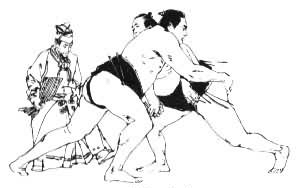Xiangpu or Xiangbo
相扑
During the period of Tang and Song dynasties,Juedi was also called Xiangpu.When it came to the Qing dynasty,Juedi had other names Buku or Wrestling.
唐宋时期,相扑一名取代了角抵;清代,则被称为布库或摔跤。
Though the name was different, the contents and forms had no changes in nature.
虽然名称有了改变,活动的具体内容和形式则并无实质性的变化。
The name Xiangpu first appeared in the Jin dynasty.When it came to Tang and Song dynasties,the word Xiangpu was often seen and heard.
相扑之名,最早见于晋代。至唐宋时期,相扑一词的运用已极为广泛。
The wrestling team in the court in the Tang dynasty was called “Xiangpu Friends”,and the folk organization in the Song dynasty was “Xiangpu Association” and so on.
唐代宫廷中的专业摔跤表演队,也被称为“相扑朋”;宋代的民间摔跤组织,则被称为“相扑社”,等等。
Xiangpu in the Tang dynasty was quite different from Juedi mixed with baixi in Qin and Han dynasties.It had developed into a special competition.
唐代的相扑运动与秦汉时期角抵的不同之处就在于它已成为一项独立的体育竞技活动。
It stipulated then that Xiangpu players should undress the clothes and play to the accompaniment of the drum.
当时的相扑比赛规定相扑手要袒露身体,比赛时还要擂鼓助兴。
Many emperors in the Tang dynasty loved watching the game.According to the record,during the reign of Xuanzong Xiangpu competitions were often held in the court,and a wrestling team named “Xiangpu Friends” was even organized.
唐代有不少皇帝爱看相扑表演。据史载,唐玄宗时,常常在宫中举行相扑比赛,甚至还专门为此组织了一个号为“相扑朋”的摔跤队。
Besides,Tang Yizong,Tang Xizong and Tang Zhaozong also loved watching it,and Tang Xizong often had wrestling competitions with the eunuches in the inner loyal court.
此外,唐懿宗、唐僖宗、唐昭宗也都爱看相扑表演,而且,唐僖宗还经常在内苑与太监进行摔跤比赛。

Xiangpu in the Song dynasty was much more popular than in the Tang dynasty, which can be found in three aspects.
到了宋代,相扑运动开展得更为普及。宋代的相扑运动开展得比唐代还要普及,这主要表现在三个方面。
(1)The Imperial Xiangpu team in the Song dynasty was more standardized.The team was named“Neidengzi”,consisting of 36 players classified into three grades—first,second and third.
(1)宫廷相扑表演队伍更规范。宋朝的宫廷相扑队称为“内等子”,共有36名队员,分为上、中、下三等,
The first and second grades had ten players in each and the third had 16. Besides, the team had 70 reserves. They served as attendants of the emperor at other times except for Xiangpu performances.
上等10名,中等10名,下等16名。另外,还有70名预备队员。这些相扑队员除了专门在各种场合进行相扑表演,平时就担任皇帝的侍卫。
Furthermore, general examination would be held every four years among the Neidengzi, by which the unqualified players would be eliminated, and new ones would be chosen from the reserves to make up the team;
而且,每隔三年,内等子就要举行一次大的考核,把不合格的队员淘汰,再从预备队中补充新队员。
(2)the folk Xiangpu was more popular in the Song dynasty.During the period of the Northern Song dynasty,a folk organization named“Xiangpu Association”appeared in the capital Bianliang.
(2)民间相扑运动更为普及。北宋时期,在都城汴梁出现了一种名为“相扑社”的民间组织。
The members of the organization mostly lived on Xiangpu performances,so they made a series of regulations named“Organization Rules.”
相扑社的成员大多以相扑表演为生,为此,他们还制定了相扑表演的一系列规则,名为“社条”。
They had special referees named“Bushu” for the performances.Another point which was worth mentioning was that women members appeared in the Xiangpu Association,which was very conspicuous in the ancient time with serious Confucian;
在相扑表演时,还有专门的裁判,称为“部署”。尤其值得一提的是,在宋代相扑社中,还出现了女子相扑队员,这在封建礼教森严的古代,是十分引人注目的。
(3)Xiangpu Ring competition emerged.
(3)出现了相扑擂台赛。
When it came to the Yuan-and-Ming time,Xiangpu was relatively on the wane.
元明时期,相扑运动进入低潮。
Folk Xiangpu was banned,and it was performed in the army mainly as a military training.Though it was not prohibited in the Yuan dynasty, its popularity could not be compared with that in the Tang-and-Song period.
民间相扑禁止,于是相扑多在军中举行,并且更多的是作为一种军事训练活动来进行的。至明朝,虽然朝廷不禁止民间相扑,但其普及程度仍无法与唐宋时期相比。
Until the Ding dynasty, the Government advocated wrestling, so it was much more prosperous than ever before.
一直到清朝,由于清廷对摔跤运动的提倡,清代的摔跤运动比历史上的任何朝代都要兴盛。
It should be pointed out that Xiangpu is considered “National Game” and developed everywhere in Japan.
相扑运动如今在日本被称为“国技”,开展得十分广泛。
The Japanese Xiangpu has certain relationship with the Chinese Xiangpu,and many scholars believe that it is introduced into Japan by the ambassadors to Sui and the ambassadors to Tang then.This matches the history.
不过,日本的相扑运动与中国的相扑运动存在渊源关系,有不少学者认为,日本的相扑运动是隋唐时期的遣隋使和遣唐使从中国引进过去的,这一观点是较为符合历史事实的。












